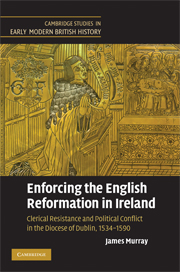 Enforcing the English Reformation in Ireland
Enforcing the English Reformation in Ireland Book contents
- Frontmatter
- Contents
- List of Tables
- Acknowledgements
- List of Abbreviations
- Note on Conventions
- Titles in the Series
- Introduction
- 1 ‘Handmaid’ of the English Church: the diocese of Dublin on the eve of the Reformation
- 2 Faithful Catholics of the English nation: patriotism, canon law and the corporate clergy
- 3 Rebellion and supremacy: Archbishop Browne, clerical opposition and the enforcement of the early Reformation, 1534–40
- 4 ‘God's laws and ours together’: Archbishop Browne, political reform and the emergence of a new religious settlement, 1540–2
- 5 The rise and fall of the viceroy's settlement: property, canon law and politics during the St Leger era, 1542–53
- 6 Archbishop Dowdall and the restoration of Catholicism in Dublin, 1553–5
- 7 Rejuvenation and survival: the old religion during the episcopacy of Hugh Curwen, 1555–67
- 8 Archbishop Loftus and the drive to protestantise Dublin, 1567–90
- Afterword
- Appendix 1 The division of administrative responsibilities between the two Dublin cathedrals
- Appendix 2 The parishes of the diocese of Dublin, 1530–1600
- Bibliography
- Index
3 - Rebellion and supremacy: Archbishop Browne, clerical opposition and the enforcement of the early Reformation, 1534–40
Published online by Cambridge University Press: 28 July 2009
- Frontmatter
- Contents
- List of Tables
- Acknowledgements
- List of Abbreviations
- Note on Conventions
- Titles in the Series
- Introduction
- 1 ‘Handmaid’ of the English Church: the diocese of Dublin on the eve of the Reformation
- 2 Faithful Catholics of the English nation: patriotism, canon law and the corporate clergy
- 3 Rebellion and supremacy: Archbishop Browne, clerical opposition and the enforcement of the early Reformation, 1534–40
- 4 ‘God's laws and ours together’: Archbishop Browne, political reform and the emergence of a new religious settlement, 1540–2
- 5 The rise and fall of the viceroy's settlement: property, canon law and politics during the St Leger era, 1542–53
- 6 Archbishop Dowdall and the restoration of Catholicism in Dublin, 1553–5
- 7 Rejuvenation and survival: the old religion during the episcopacy of Hugh Curwen, 1555–67
- 8 Archbishop Loftus and the drive to protestantise Dublin, 1567–90
- Afterword
- Appendix 1 The division of administrative responsibilities between the two Dublin cathedrals
- Appendix 2 The parishes of the diocese of Dublin, 1530–1600
- Bibliography
- Index
Summary
The Reformation began in the diocese of Dublin in an atmosphere of crisis, provoked by the outbreak of the Kildare rebellion in the summer of 1534. Although motivated initially by secular concerns – the Fitzgeralds’ desire to force the abandonment of the political and administrative reforms of the king's chief minister, Thomas Cromwell – the revolt swiftly assumed a religious dimension. From an early stage, Silken Thomas and his supporters claimed that they were ‘of the pope's sect and band and him will they serve against the king and all his partakers’. For the Tudor regime, and for many historians subsequently, the most striking aspect of this claim was the possibility that it might secure for the Kildare cause military or financial support from the papacy and the Holy Roman emperor, thus turning what was a domestic disturbance into an international Catholic crusade against aschismatic English king. In practice its repercussions were less dramatic. Yet it still proved to be damaging to the fate of the Henrician Reformation in Ireland. In justifying their decision to play the papal card, the Fitzgeralds drew heavily upon the thinking, and sought the support, of the clerical elite of the English Pale, especially amongst the Dublin diocesan establishment based in St Patrick's Cathedral.
- Type
- Chapter
- Information
- Enforcing the English Reformation in IrelandClerical Resistance and Political Conflict in the Diocese of Dublin, 1534–1590, pp. 82 - 124Publisher: Cambridge University PressPrint publication year: 2009


